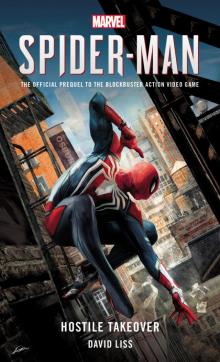- Home
- David Liss
Paleo / The Doomsday Prepper
Paleo / The Doomsday Prepper Read online
Paleo
JOURNALSTONE’S DOUBLE DOWN SERIES, BOOK VI
By
David Liss
JournalStone
San Francisco
Copyright © 2015 by David Liss
All rights reserved. No part of this book may be used or reproduced by any means, graphic, electronic, or mechanical, including photocopying, recording, taping or by any information storage retrieval system without the written permission of the publisher except in the case of brief quotations embodied in critical articles and reviews.
This is a work of fiction. All of the characters, names, incidents, organizations, and dialogue in this novel are either the products of the author’s imagination or are used fictitiously.
JournalStone books may be ordered through booksellers or by contacting:
JournalStone
www.journalstone.com
The views expressed in this work are solely those of the authors and do not necessarily reflect the views of the publisher, and the publisher hereby disclaims any responsibility for them.
ISBN: 978-1-942712-30-5 (sc)
ISBN: 978-1-942712-31-2 (ebook)
ISBN: 978-1-942712-33-6 (hc: limited edition)
JournalStone rev. date: June 12, 2015
Library of Congress Control Number: 2015938645
Printed in the United States of America
Cover Art & Design: Chuck Killorin
Edited by: Aaron J. French
PALEO
PALEO
Pete waited four weeks before going across the street to talk to the new neighbor. It made no sense that this guy would want his property to look like shit, and Pete was content to believe that sooner or later the problem would fix itself. It didn’t, and Jenny kept looking out the window, and then glaring at Pete like it was his fault, like Pete was the only thing in the universe standing in the way of her happiness.
Pete had enough to worry about, and he had a hard time seeing how this was on him. Some guy decided to buy the McMansion across the street and let his yard turn into a jungle. Sure, it looked terrible, but who, when you really thought about it, gave a crap? Jenny for one, but she wasn’t about to actually take matters into her own hands. Pete figured eventually one of the other neighbors would speak to the guy, but as far as he could tell, no one did.
The breaking point came for Pete when they went over to the Hudsons’ for dinner on Friday night. Jenny had been best friends with Lola Hudson back in high school, when she was Lola Macklin. She’d been sort of a mousy thing then, like Jenny had been, but Lola had discovered sluttiness at A&M and caught the eye of Rick Hudson, with whom they’d gone to school their whole lives. He’d never noticed the old Lola, with her glasses and messy hair hidden under sweatshirt hoods, but he liked the new one with contact lenses and exposed cleavage and circus-act high heels.
They got hitched shortly after graduation and moved back to San Antonio. Jenny, who was married to Pete by then, resumed the old friendship. That meant Pete had to pretend that Rick had not spent all of high school, and much of middle school, acting like a total asshole. It wasn’t that Rick had bullied Pete – good fucking luck with that. Once in a while, someone would get it into his head that Pete, who had been on the quiet side, was easy prey. He’d been wiry and slender back then, but strong as hell, and anyone who got in his face regretted it. Rick hadn’t been much of a brawler, but he’d had an attitude like he’d known all along that he was going places and Pete wasn’t. Contempt was the word. Rick had always treated Pete with contempt. Now the two of them were supposed to be pals.
Pete had never really planned much for the future, and he’d more or less stumbled into the home inspection business. Rick, meanwhile, had majored in geology and right after graduation he went to work for one of the big oil companies. They now had a huge house in Alamo Heights, which Pete found distasteful to visit, drive past, discuss, or picture in his mind. He hated how Rick loved playing the host, taking out some new prize bottle of scotch or wine that he could show off and casually mention which politician had sent it to him as a gift or how much it had cost at auction. He hated how he would show off some modification they’d done to the house or the pool or the guest house. Then Rick would say, “So, what’s happening at your homestead?” and he would smile because he knew that jackshit was happening at Pete’s homestead. Pete’s homestead wasn’t changing any time soon. They weren’t going to be adding a hot tub or a wine cellar or a fucking solarium.
Pete would say that things were the same as they always were, but now even this had become a lie. Things were not nearly that good, but he wasn’t about to admit that to Rick. He hadn’t even come clean to Jenny.
After dinner, Chilean sea bass – “Thirty-two dollars a pound,” Rick told them, “and there’s plenty of it!” – prepared and served by an equally Chilean housekeeper, the four of them sat in the living room in the glow of Rick’s 70 gallon saltwater aquarium. Rick had a guy come in once a week to maintain it, he liked to say just about every time they came over. Who, he wanted to know, could be bothered to do it themselves? But it looked great, right? Right?
Jenny and Lola had huddled off into their own conversation, as inevitably happened. These girl-chats came in two varieties: the loud and explosive giggles, which annoyed Pete, or the serious, staccato whispers, which terrified him. Even worse, with the wives having self-exiled, Pete was left alone with Rick, who swirled his postprandial scotch around his glass and sniffed at it and nodded his approval.
Rick, on top of everything else, was still fit and had all his hair. Pete, by contrast, had gained fifty pounds since high school and the hair was beginning to recede. Maybe it had already receded. He thought he had a shrinking hairline, but the week before he’d heard one of his daughter’s friends describe him as bald. Rick was getting stronger and richer and better looking. Pete was getting fatter and poorer and more pathetic. Most of the time he could convince himself that this was just life. This was what happened. You couldn’t be like someone on a TV show because those people were made up. Then he would come over to Rick’s house and he would be reminded that it wasn’t just fantasy. Some people really did live that way – people he knew, people with whom he’d gone to high school, people who had made different choices.
“I heard you have a problem with your new neighbor?” Rick was saying as he sniffed at his scotch.
“How’d you hear that?” Pete asked. He took an experimental sip of the drink and tried not to wince. Scotch, in his opinion, tasted like complete shit. The good stuff tasted like a different kind of shit than the bad stuff, but none of it tasted like anything Pete ever wanted to put inside of his mouth. And it wasn’t like Pete was some kind of moron who couldn’t tell the difference between quality liquor and the cheap stuff. He knew a kick ass bourbon when he tasted one, and he knew Rick had a few bottles of a pricey small batch sitting around. Pete had suggested they switch over to bourbon a few visits ago, but Rick had just said, “Nah,” and waved his hand and grinned with content triumph, as if to say you never had so much power that you could feel comfortable giving up even a little.
“This is killer, right?” Rick said, holding up his glass. “A little gift from my inside guy over at the Railroad Commissioner’s Office.”
“Tastes like smoke,” Pete said, having long since learned the right bullshit terms. “And peat.” Why the fuck anyone would want to drink something that tasted like smoke and peat was beyond him.
“So what’s the deal with the guy across the street?” Rick asked.
Pete sighed. There was no avoiding the conversation. “He won’t cut his lawn. It’s overgrown like crazy.”
“Damn, that’s no good. What do your neighbors say?”
&nb
sp; Pete shrugged. He didn’t know the neighbors anymore. The house on Laurel Lane had belonged to his parents, who moved to Arizona fifteen years ago and gave it to Pete and Jenny outright. Back when they’d first taken ownership, the neighborhood had been an actual community. Everyone had known everyone else. Pete and Jenny had gone to high school with half the people on the block. Now, all his friends had sold and moved, and Pete was the last man standing. More than that, his was one of the last houses standing. Most of the modest ranch houses had been torn down, replaced by 6,000 square foot behemoths that strained against the confines of their lots. His new neighbors – lawyers and doctors and real estate developers – squinted at Pete when he pulled into his driveway in his seven-year-old Honda like he didn’t belong there, like he was bringing down the neighborhood. Pete was the neighborhood. That’s what they didn’t get.
“I don’t really talk to the neighbors,” Pete said. He heard himself wincing, like he knew he was going to get blasted for this. When had this happened to him? When had he become the guy who hunched his shoulders and waited for the blows to land? He took another sip of the disgusting and expensive scotch to try to ward off the feeling of absolute and utter defeat.
This, he decided, was life. In high school he’d had a pretty good circle of friends. People respected how he could beat the shit out of pretty much anyone, but he never started a fight. He didn’t talk a lot, like Clint Eastwood, and he was content with himself. Some kids found that magnetic. Now he was just a guy pushing forty whose life had become a daily struggle, and no one seemed particularly drawn to that.
Rick snapped him out of this reflection by slamming his hand on the coffee table. “Dude,” he pronounced with great sadness and concern. “You’ve got to work the neighbors. On my block, I’m king shit. No one plants a flower bed without getting my say so.”
“I don’t really want to tell anyone what they can or can’t—”
“I’m not telling them,” Rick explained, helpfully cutting Pete off. His voice had gone slower and higher pitched, like he was telling a child about how the moon was really a rock in space or some shit. “At least, they don’t know I am. I mean, they think they’re coming to me for advice, and then they think they’re doing what they want to do. That’s the key to good management. I guess, working alone, you don’t really need skills like that.”
“I guess not,” Pete agreed because it seemed like a better move than breaking his glass against Rick’s face.
“You ever think about expanding? Turning that small business into a medium-sized business? I can talk you through it. Give you some pointers. No charge. Just, you know, when you make it, maybe it can be your expensive hooch we’re drinking for a change.”
Rick did his I’m joking, but I’m really not, because I’m a complete dick laugh. Pete smiled because that’s what good manners required, but he felt like a dog lowering its head in submission.
“What do you say?” Rick gave Pete a shove on one shoulder, as if to push him into prosperity. “You ready to make the leap?”
“I’m doing just fine the way things are,” Pete said, which was absolutely not true. He was not doing fine. Business had all but evaporated since the lawsuit, which was not going away, and was likely going to crush him if things didn’t change soon. Jenny didn’t know about any of this because it had all exploded in the last month, but she was going to find out sooner or later. The way she and Lola stopped whispering and turned to look at him made him wonder if she already suspected that something was wrong. That look on her face wasn’t suspicion, though. They’d been married too long for him to misunderstand the twist of her eyebrows and the lines around her mouth.
It was disappointment.
“First thing,” Rick said, finishing his scotch and slamming it down like a cowboy in a saloon, “you have to talk to your neighbor. Let him know what’s what. Act like you’re a fucking man, then you’ll feel like one. And then you’ll be one.”
Jenny looked up, still locked in her housewife huddle. Her eyebrows were knit, her mouth pursed. It was impossible to tell if she was talking to Lola or the men. “That would be nice,” she said, her voice very quiet.
* * *
The house was beautiful, a Spanish style fortress whose former inhabitants had built and lived in it for a year before selling. Pete had not spoken to them once. The new guy had hired landscapers to put in new shrubs along the stone walkway, and the BMW sports car in the circular driveway always glistened as if just washed, so Pete could not make any sense of the lawn. It hadn’t been mowed once during his neighbor’s four weeks in the house. In spite of the drought, and the water restrictions, the neighbor had been running his sprinklers three times a week. It was like he wanted the grass to grow.
The next morning around eleven o’clock Pete told Jenny he was walking over.
“Already?” she asked, looking up from her laptop, where he suspected she was shopping for things she would later complain about not being able to afford. Jenny liked to buy certain items online, mostly makeup, cookware, athletic clothes, vitamins, storage containers, handbags, scarves, and decorative objects made out of pink glass that would live out their days in boxes stacked in the garage. “You don’t want to wait a few more weeks?”
In recent years, Jenny had evidently come to find nagging so enjoyable that she couldn’t see any reason to stop, even after it had served its purpose. Pete didn’t want to get into a fight, so he just shook his head.
Then Jenny looked up and smiled at him, and it was the smile that made him think that the old Jenny was still in there, that their relationship was not lost forever. That smile was kind and warm and genuine. It said she saw things in him that no one else could be bothered to see. “It won’t be so bad,” she said.
Like Pete, she was 38, but she looked a whole lot better than he did. She kept herself trim, she’d dyed her hair blonde, and wore it in a casual ponytail. Like her friends whose husbands made more money than Pete, Jenny favored designer athletic clothes whether or not any actual athletic activity was in the forecast. Now she stood, hips cocked, eyes wide, smile mischievous. She looked good.
“I’m sure it won’t,” he said.
“Be firm,” she told him. “Don’t let him push you around.”
“I know how to talk to people,” he said.
“Of course you do. Maybe you should take Addison. He’ll probably be nicer if she’s there.”
Addison was their 12-year-old daughter, currently in the throes of early-onset moody adolescence. The last thing he wanted was to bring a disaffected tween who would scowl and roll her eyes and do a kabuki dance of boredom and embarrassment while Pete tried to politely explain to his neighbor that the front lawn of Downton fucking Abbey should not look like the Mekong Delta.
Her personal-effrontery detector always cranked to maximum, Addison now appeared at their bedroom doorway. She was tall and thin and pale-skinned and on her way to being a genuine beauty, though currently she suffered from a bit of giraffey awkwardness. Jenny wished she would grow out of it, but Pete found it endearing. He was in no rush to let go of the last traces of her childhood.
“I’m not going,” Addison announced with finality. Then she added, “Where?”
“Walk across the street with your father,” Jenny said. “You can be his human shield while he talks to the neighbor.”
Addison must have sensed the possibility for drama because she allowed herself a slight smile. “Okay.”
* * *
They stood before the massive oak double doors, ornately carved like the entrance to a medieval keep, and Pete jammed his finger into the glowing amber bubble of the doorbell. In the distance they heard the multi-note chime, not the standard ding, but a fanfare to alert the footman that a gentleman had come to call. There was a long pause, then the scrape of feet, followed by the science-fictional beeping of the alarm system being told to stand down and, finally, the heavy thud of impenetrable locks unbolting. The door swung inward and Pete got his first glim
pse of his new neighbor.
Much to Pete’s dismay, he looked like an action movie hero. The guy was probably six-two, in his early thirties, with a full head of hair, and a handsome, cover-of-Men’s-Health face. He wore jeans and a black t-shirt, and there was no mistaking that this guy was in fantastic shape. Veins like tree roots lined his arms, and under his sleeves his biceps looked like balloons ready to burst.
“Yeah,” he said. “What?”
Pete glanced over at Addison, who had her ear buds in place and was fiddling with her iPhone. That, at least, was good. He didn’t want his daughter to see this meathead be an asshole to her father.
“Hey, there,” he said. “I just wanted to talk to you about your grass.”
The guy shook his head. “I’m not hiring anyone right now. Leave me a card or something.”
It took Pete a few seconds to recover. The guy thought he wanted to mow the lawn? Had something happened since Pete last looked in the mirror that would make this guy think he was a Mexican? Not that there was anything wrong with looking Mexican – or being Mexican for that matter. Pete, who considered himself enlightened, believed Mexican was an okay thing to be if that was how the dice rolled for you, but he was a white guy who looked like nothing but a white guy, and he lived in a town where no white guy over the age of 17 had mowed a lawn for money since before Prohibition.
Treat the guy like a client, Pete told himself. Be a businessman, focus on the goal. The goal was that everyone should think they were being treated fairly. He took a deep breath to steady himself. “I’m Pete. I live across the street.”
“And?” the man inquired.
Pete forced a laugh. He was being a friendly guy, controlling the tone of the conversation. “So, now one of us knows who the other is.”

 The Whiskey Rebels
The Whiskey Rebels Renegades
Renegades The Twelfth Enchantment: A Novel
The Twelfth Enchantment: A Novel The Day of Atonement
The Day of Atonement The Devil's Company
The Devil's Company Randoms
Randoms Paleo / The Doomsday Prepper
Paleo / The Doomsday Prepper Rebels
Rebels A Spectacle of Corruption
A Spectacle of Corruption The Twelfth Enchantment
The Twelfth Enchantment The Coffee Trader
The Coffee Trader The Ethical Assassin
The Ethical Assassin The Devil’s Company: A Novel
The Devil’s Company: A Novel The Double Dealer
The Double Dealer The Whiskey Rebel
The Whiskey Rebel A Conspiracy of Paper bw-1
A Conspiracy of Paper bw-1 The Devil's Company bw-3
The Devil's Company bw-3 Marvel's SPIDER-MAN
Marvel's SPIDER-MAN